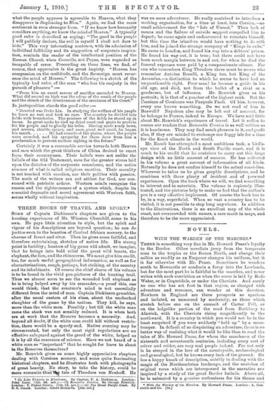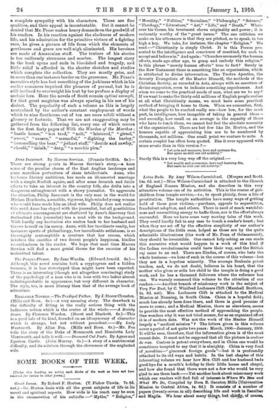NOVELS.
WITH THE WARDEN OF THE MARCHES.*
THERE is something very fine in Mr. Howard Pease's loyalty to the Border. Other novelists jump from the temperate zone to the tropics or the frozen North, and change their milieu as readily as an Emperor changes his uniform, but it is far otherwise with Mr. Pease. Sometimes he wanders south to Newcastle or conducts a foray into the Lowlands, but for the most part he is faithful to the marches, and never writes with such conviction as when the scene is laid by Rode Water, or in Coquetdale, or under the Cheviots. And surely no one who has set foot in that region, so charged with adventure and romance, can wonder at this devotion. Nowhere in England are there prospects so spacious and isolated, so unmarred by modernity, as those which stretch before one on the summit of Carter Fell, or on the ledgelike portion of the road from Rothbury to .Alnwick, with the Cheviots rising magnificently to the northward. It is a country in which you would not be in the least surprised if you were suddenly " held up " by a moss- trooper. In default of so disquieting an adventure, there is no better way of realising what it would be like than to read the tales of Mr. Howard Pease, for whom the marchmcn of the sixteenth and seventeenth centuries, including every sort of reiver and raider, are very real people indeed. For not only is he steeped in the lore of the countryside, archaeological and genealogical, but he knows every inch of the ground. Ile has a happy knack of description, notably in dealing with the magic of the Northumbrian landscape, and the snatches of original verse which are interspersed in the narrative are inspired by a study of the great Border ballads. Above all, he is animated by a genuine enthusiasm for his theme and • with the Warden of the Marches. By Howard. Pease. London : A. Con- stable and Co. Oa.] a complete sympathy with his characters. These are fine qualities, and their appeal is incontestable. But it cannot be denied that Mr. Pease makes heavy demands on the goodwill of his readers. In his reaction against the slackness of modern life, and his admiration for the primitive virtues of a fighting race, he gives a picture of life from which the elements of gentleness and grace are well-nigh eliminated. His heroines are made of Amazonian stuff. The texture of his stories is too uniformly strenuous and sombre. The longest story in the book opens and ends in bloodshed and tragedy, and little relief is afforded in the shorter sketches and studies which complete the collection. They are mostly grim, and in more than one instance border on the gruesome. Mr. Pease's narrative style has lost something of the jerkiness which in his earlier romances impaired the pleasure of perusal, but he is still inclined to overweight his text by too profuse a display of archaic lore. Here the novels of Scott remain optimi ezempli, for that great magician was always sparing in his use of his dialect. The popularity of such a volume as this is largely neutralised by the author's constant employment of words -which to nine Soutbrons out of ten are votes nihili without a glossary or footnote. That we are not exaggerating may be gathered from the following list, every one of which occurs in the first forty pages of With the Warden of the Marches : " bogie house," " hot trod," " nolt," " leistered," " girnel," "awed," " cassen," " menseful," " dighting the barley,"
hunimelling the bear," " jethart staff," "double and sawfey," " ehesfit," " inlaik," " darg," "a muckle pirn."















































 Previous page
Previous page